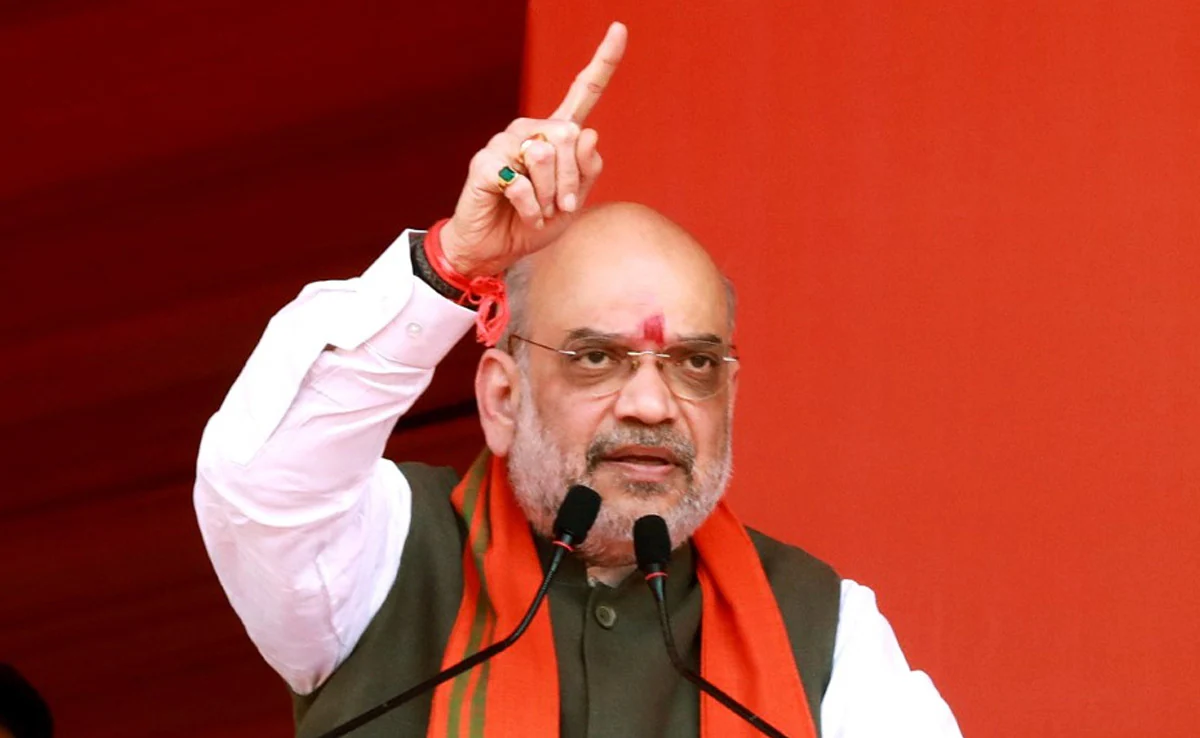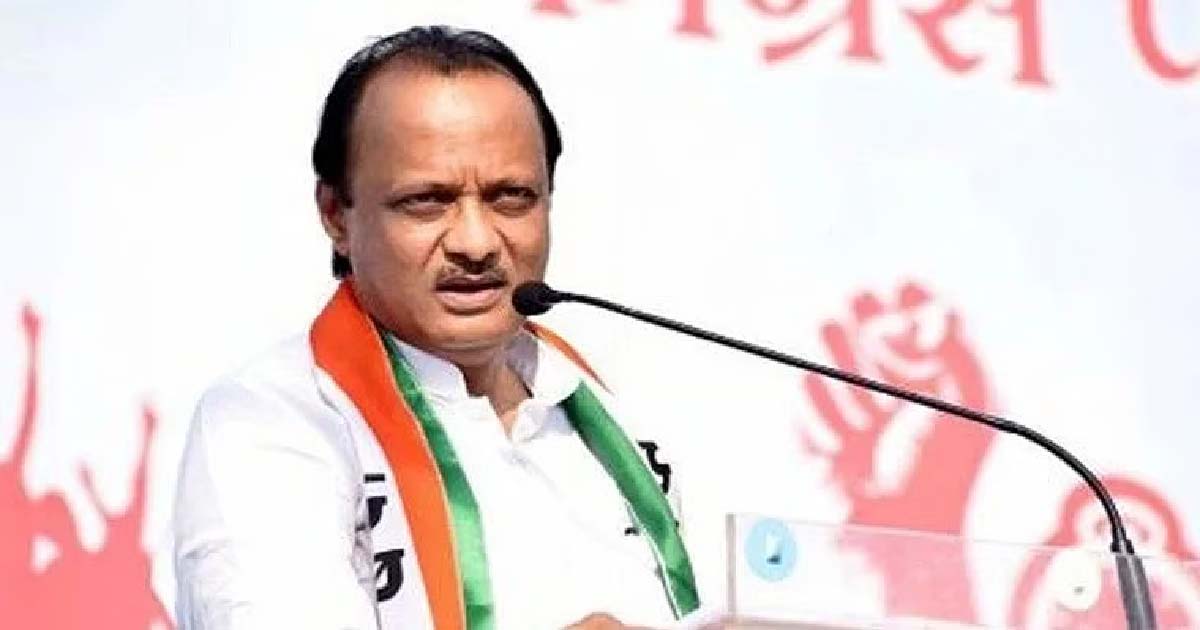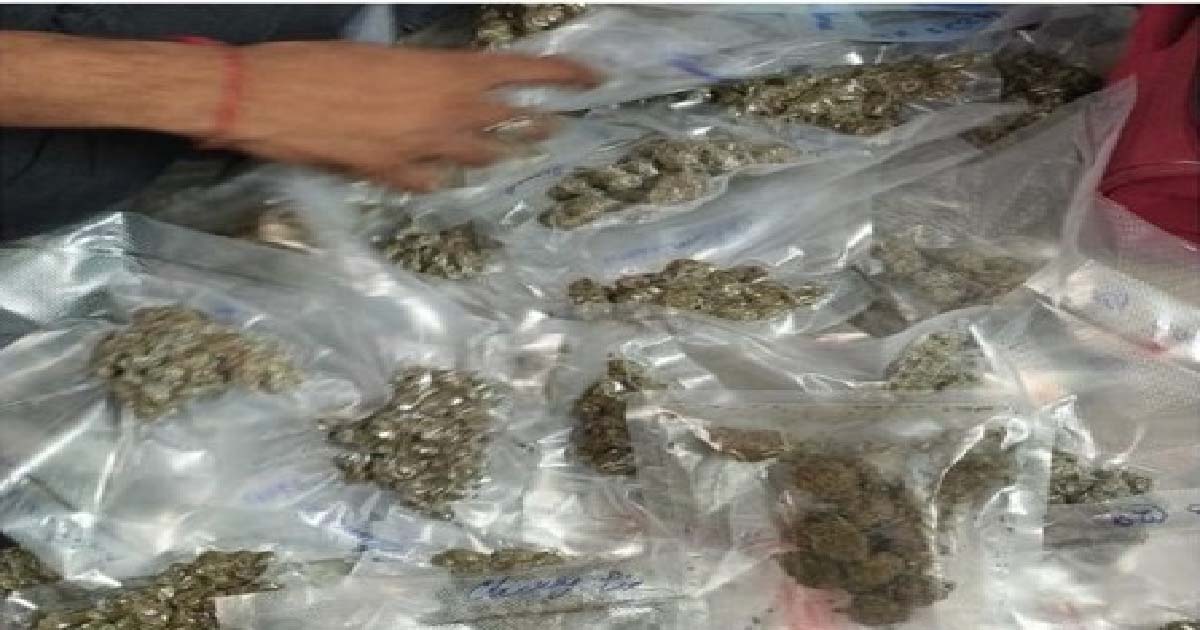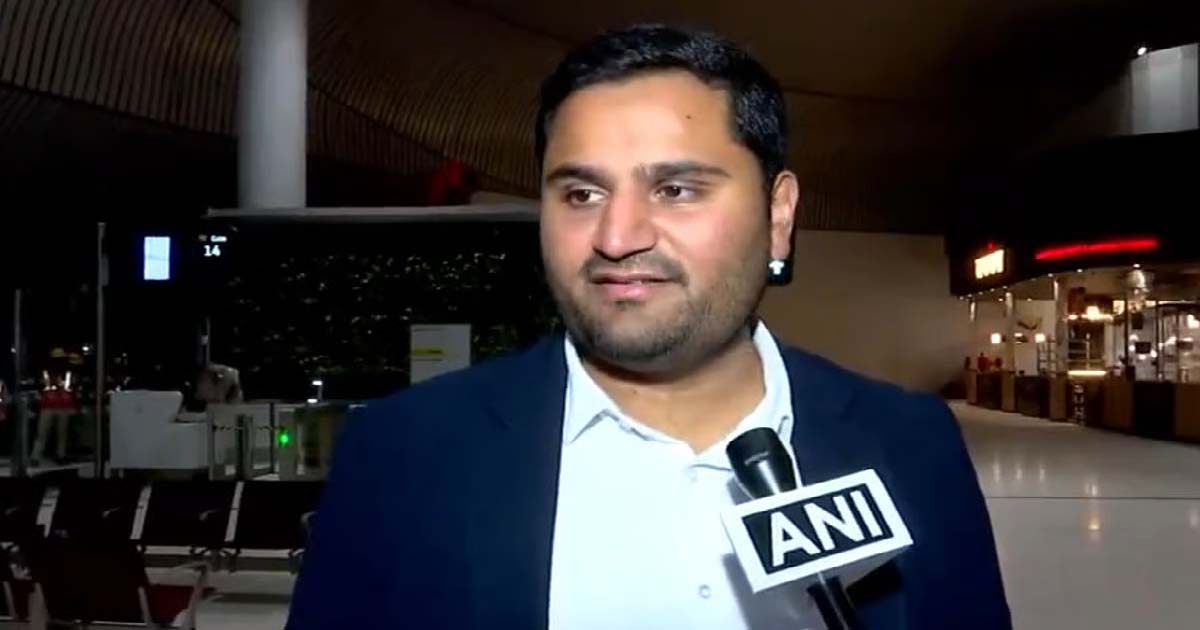National News
Manipur Violence: Amit Shah ‘personally monitoring’ the issue; holds meetings with Biren Singh & CMs of neighbouring states

New Delhi: Union Home Minister Amit Shah on Thursday held two meetings over video-conferencing and spoke with the chief ministers of Manipur and its neighbouring states, over the disruption law and order in the Northeast state after tribal groups took out rallies in several districts there, sources said.
Manipur CM N Biren Singh, Union Home Secretary Ajay Bhalla, Director Intelligence Bureau Tapan Deka and officials concerned in the state as well as in the Centre took part in the two video conferences.
Amit Shah asks Manipur and its neighbours to be cautious
The Home Minister also spoke with the chief ministers of neighbouring states, asking them to be more cautious until the situation in Manipur is controlled properly.
The Home minister also assured all possible help to maintain peace in Manipur and deploy more central security forces in the state to enforce order.
Home Minister reportedly is personally monitoring the situation
According to sources, the Home Minister has been personally monitoring the situation in Manipur.
Earlier in the day, the Home minister spoke to Manipur Chief Minister Biren Singh. In the telephonic conversation with the CM, the Home minister was apprised of the present situation and the steps being taken by the state government to control it, said sources Sources also pointed out that major deployment of security forces is being done in Manipur.
Forces deployed
“Several companies of BSF, CRPF and Assam Rifles along with the Army were deployed in the state yesterday and today. Further deployment of security forces will be done tomorrow as well. Maximum deployment of CRPF is being done in the hill state,” a source said.
According to sources, five companies of Rapid Action Force (RAF) were dispatched to Manipur earlier on Thursday. However, an adequate number of Army, Assam Rifles and other Central Armed Police Forces are already deployed at the violence-torn areas to control the situation. The RRAF is a specialised wing of the Central Reserve Police Force (CRPF) to deal with riot and crowd control situations.
Internet suspended
To tackle the worsening law and order situation after tribal groups took out rallies in several districts of Manipur, the state government suspended mobile internet for five days. Along with a ban on large gatherings, a night curfew, too, has been imposed in several districts of the state.
In view of the situation, a curfew has been imposed in non-tribal-dominated Imphal West, Kakching, Thoubal, Jiribam, and Bishnupur districts, and tribal-dominated Churachandpur, Kangpokpi, and Tengnoupal districts.
The Manipur government, in a statement, said, “Internet services suspended in Manipur for five days amid incidents of fighting among youths, and volunteers of different communities as a rally was organised by All Tribals Students Union (ATSU) Manipur in protest against the demand for inclusion of Meitei/Meetei in the ST category.”
It is believed that two issues in the state are believed to have led to the prevailing situation.
First, CM Biren Singh’s move to protect the forest faces resistance from illegal immigrants and drug cartels, and the second is linked to the Manipur High Court’s recent direction to the state government to consider the inclusion of Meitei in the list of Scheduled Tribes (STs), which led to an outburst from the tribal communities which are already on the scheduled list.
Violence broke out during the ‘Tribal Solidarity March’ called by the All Tribal Student Union Manipur (ATSUM) in the Torbung area of Churachandpur district to protest the demand of non-tribal Meiteis, who dominate the Imphal Valley, for Scheduled Tribe (ST) status.
Thousands of tribals, who make up about 40 per cent of the state’s population, joined the processions, waved placards and raised slogans opposing ST status for the Meitei community.
National News
Maharashtra Deputy CM Ajit Pawar-Led NCP To Consider Solo Run In Thane As Allies Exclude It From Seat Talks

Thane: The Ajit Pawar-led NCP on Tuesday said it has kept open the option to contest the upcoming Thane municipal council elections separately as it was being kept out of the seat-sharing discussions by its allies in Mahayuti.
Nationalist Congress Party spokesperson Anand Paranjape claimed that while local leaders of the BJP and Shiv Sena have already initiated talks to finalise seat sharing in the TMC polls, the NCP has not been invited for these deliberations.
“Even though meetings of the alliance partners are underway, the NCP has not been invited. Therefore, we have begun preparations to contest the elections independently,” he said.
Our Thane district president, Najeeb Mulla, has not been contacted by either the BJP or the Shiv Sena, Paranjape claimed.
He said the NCP would declare its seat expectations only after being formally invited to the alliance talks.
He said 380 aspirants have been interviewed over the past two days.
“If the NCP is offered respectable representation in the alliance for the Thane Municipal Corporation, we are ready to contest together. Otherwise, the NCP is fully prepared to contest all 131 seats on its own,” he added.
Paranjape said the NCP favours contesting as part of the grand alliance wherever possible, but local tie-ups or independent contests would also be considered if necessary.
Referring to the recent elections to 288 municipal councils and nagar panchayats, Paranjape said mayors from the grand alliance of BJP, Shiv Sena, and NCP were elected in around 215 bodies.
“People of Maharashtra have reaffirmed their faith in the Mahayuti government led by Chief Minister Devendra Fadnavis and Deputy Chief Ministers Ajit Pawar and Eknath Shinde,” he added.
The long-awaited polls to 29 municipal corporations in Maharashtra, including cash-rich Mumbai, will be held on January 15, and votes will be counted on the following day.
Crime
Delhi Police arrest female drug peddler, seize ganja and cash

New Delhi, Dec 23: In a major boost to the Centre’s ‘Drug-Free India’ campaign, Delhi Police have arrested a female drug peddler in Nihal Vihar and recovered 341 grams of ganja along with Rs 3.72 lakh in cash, suspected to be proceeds from the sale of narcotics, officials said on Tuesday.
According to Delhi Police, the action was carried out by a patrolling team of Police Station Nihal Vihar on December 20, following specific directions from the Deputy Commissioner of Police, Outer District, to maintain heightened vigilance against drug trafficking.
The team, comprising ASI Arvind, Woman Head Constable Yogita and Constable Sanjeet, was on routine patrol in the Adhyapak Nagar area when they noticed a suspicious woman standing near a house close to Pari Garden with a brown-coloured carry bag.
Police said that as soon as the woman noticed the patrol team, the crowd gathered around her dispersed, and she attempted to flee.
“On sensing the police staff, the crowd dispersed immediately, and the female carrying the brown-coloured carry bag also attempted to flee, but the vigilant team swiftly chased and apprehended her on the spot,” the police said in its press note.
Upon weighing, the contraband was found to be 341 grams of ganja. A total sum of Rs 3,72,830 was also recovered, which police believe to be proceeds from the illegal sale of narcotics.
The seized drugs and cash were confiscated on the spot following due legal procedures.
Subsequently, a case was registered at Police Station Nihal Vihar vide FIR No. 960/2025 under Section 20(b)(ii)A of the Narcotic Drugs and Psychotropic Substances (NDPS) Act. The accused woman was formally arrested in the case.
Further verification revealed that the accused has a criminal history and was previously involved in more than five cases under the Delhi Excise Act, police said.
“The Outer District police remain committed to eliminating narcotics-related crimes and safeguarding the community,” said DCP Sachin Sharma.
National News
‘Stolen Symbol, Hollow Claim’: Shiv Sena (UBT) Attacks Maharashtra Deputy CM Eknath Shinde’s ‘Real Sena’ Assertion After Local Body Polls

Mumbai: The Shiv Sena Uddhav Balasaheb Thackeray (UBT) on Tuesday attacked Deputy Chief Minister and Shiv Sena chief Eknath Shinde over his claim that Maharashtra local body polls have finally settled the debate over the “real” Shiv Sena.
In a scathing editorial in the party’s mouthpiece, ‘Saamana’, the Thackeray camp claimed, “The liars say, ‘Our Shiv Sena is real!’ But what is real and what is fake – the common people of the state recognise this. Those who dedicated their victory to Modi-Shah’s feet, the symbol ‘Shiv Sena’ does not suit those thieves. These same Modi-Shah stole the bow and arrow and handed it over to eight traitors in Maharashtra. The theft of Lok Sabha, Vidhan Sabha and local body elections has taken the form of ‘yours, mine, theirs’. The picture ahead will be different – we have no doubt about this.”
According to the editorial, Eknath Shinde has claimed credit for the work shown by the real Shiv Sena people. This is a hollow credit. His party’s claim of solid work in Lok Sabha, Vidhan Sabha and now local body elections is hollow. “Originally, the name ‘Shiv Sena’ and the symbol bow and arrow were obtained through Amit Shah’s pressure. The merit of the bow and arrow is significant, and Balasaheb Thackeray, the Shiv Sena chief, had established the ‘bow and arrow’ in every household. These ‘merits’ have been stolen and the real Shiv Sena is being talked about,” said the editorial.
It further stated that the dispute between Shiv Sena and the bow and arrow is still pending in the Supreme Court. The Supreme Court has given six months’ time for the Election Commission to make a decision. “Dates are not being set there, but after 40 MLAs crossed over to the other side and the decision was made according to law and constitution, Shiv Sena and bow and arrow are encouraging a decision on whose symbol it is!” the editorial said.
The Thackeray camp said that despite the electoral successes of the Shinde-led Shiv Sena, legal disputes regarding the party’s “real” status and official symbols remain unresolved. It said, “The Supreme Court has scheduled a final hearing for January 21, 2026, to address the symbol dispute between the Uddhav Thackeray and Eknath Shinde factions. A similar hearing for the NCP symbol dispute is set for January 22, 2026. The year ends with political parties shifting focus toward the Brihanmumbai Municipal Corporation (BMC) elections, which are slated for January 15.” The editorial has even questioned the timing of the hearing in the court.
The Uddhav Thackeray-led Shiv Sena alleged, “The results of local body elections are bought and sold through auction. There is no integrity or transparency found anywhere in these results. The ruling party has acquired the art of buying the machinery and voters, and people like Amit Shah kindly make them win elections by stealing the Shiv Sena and bow and arrow. As Chief Minister Devendra Fadnavis vows to transform the face of the state following these results, the opposition remains defiant. They describe the current political state as one of ‘looting and deception’ and express confidence that the political picture in Maharashtra will shift in the future,” said the editorial.
-

 Crime3 years ago
Crime3 years agoClass 10 student jumps to death in Jaipur
-

 Maharashtra1 year ago
Maharashtra1 year agoMumbai Local Train Update: Central Railway’s New Timetable Comes Into Effect; Check Full List Of Revised Timings & Stations
-

 Maharashtra1 year ago
Maharashtra1 year agoMumbai To Go Toll-Free Tonight! Maharashtra Govt Announces Complete Toll Waiver For Light Motor Vehicles At All 5 Entry Points Of City
-

 Maharashtra1 year ago
Maharashtra1 year agoFalse photo of Imtiaz Jaleel’s rally, exposing the fooling conspiracy
-

 National News1 year ago
National News1 year agoMinistry of Railways rolls out Special Drive 4.0 with focus on digitisation, cleanliness, inclusiveness and grievance redressal
-

 Maharashtra1 year ago
Maharashtra1 year agoMaharashtra Elections 2024: Mumbai Metro & BEST Services Extended Till Midnight On Voting Day
-

 National News1 year ago
National News1 year agoJ&K: 4 Jawans Killed, 28 Injured After Bus Carrying BSF Personnel For Poll Duty Falls Into Gorge In Budgam; Terrifying Visuals Surface
-

 Crime1 year ago
Crime1 year agoBaba Siddique Murder: Mumbai Police Unable To Get Lawrence Bishnoi Custody Due To Home Ministry Order, Says Report












